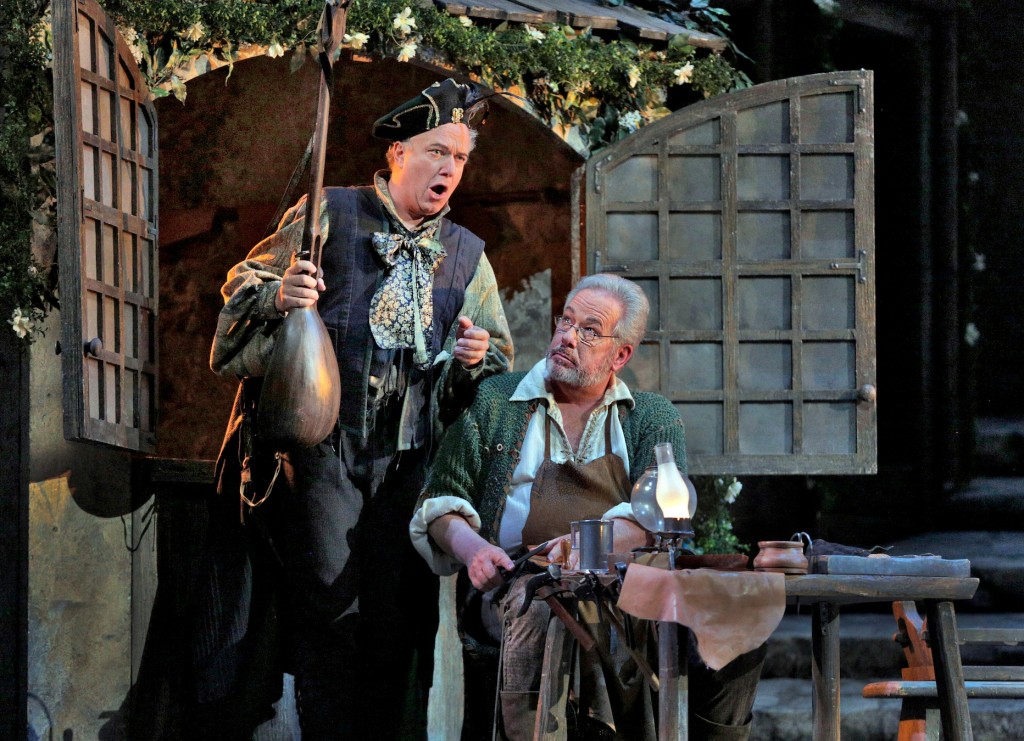Met’s stolid “Meistersinger” fails to reach the high notes

Johannes Martin Kränzle as Beckmesser and James Morris as Hans Sachs in Wagner’s “Die Meistersinger von Nürnberg” at the Metropolitan Opera. Photo: Ken Howard
In all the uproar over the alleged anti-semitism of John Adams’s The Death of Klinghoffer, one item on the Metropolitan Opera schedule curiously slipped through unnoticed. While plans for an HD simulcast of Adams’s opera were scuttled, the HD presentation of Richard Wagner’sDie Meistersinger von Nürnberg will proceed.
Like much of Wagner’s music, Meistersinger has a troubled history, due especially to its later association with Nazism and twentieth-century German nationalism more broadly. Wagner’s own anti-semitism is well documented, and it has even been suggested that the opera’s pedantic antagonistic, Sixtus Beckmesser, is himself an anti-semitic caricature.
But in spite of its author’s prejudices, Meistersinger remains a seminal work by one of opera’s great masters, and it returned to the Met’s stage on Tuesday night—mercifully, without protest. Unfortunately, Tuesday’s six-hour-and-ten-minute season premiere did not exactly fly by. One might have expected an illuminating performance under the baton of James Levine, and his direction was clear, communicative, and clean, aside from a couple of shaky crowd scenes.
Levine’s conducting, though, lacked energy, and not just because of his deliberate tempi. The Met orchestra, for all their suppleness and rich textures, did not play with much fire, nor with sparkle, aside from the comedic trickery between Sachs and Beckmesser in Act II and the ensuing riot. Even the swaggering Act One Prelude seemed comparatively dull.
James Morris’s portrayal of the cobbler and poet Hans Sachs was a serviceable victory lap. The veteran bass-baritone has lost some meat off his voice since his masterful performances of the role a decade ago, and the part’s topmost range was simply out of his reach on Tuesday. Still, his vocal shortcomings actually give his Sachs a sort of naturalistic gruffness, and now and then he was able to conjure up some of his bygone rolling thunder, as in his ruminative monologue near the top of the third act.
The heroic couple were solid, but never outstanding. Johan Botha mostly took a stand-and-deliver approach to the role of the amorous knight Walther, and what he delivered was, while vocally powerful and technically solid, lacking in nuance. His performances of the mastersong, rather than taking wing, seemed encumbered—his top was clear, but never thrilling. The same went for Annette Dasch, who brought volume and consistent tone to bear as Eva, but found few lyrical moments.
It was the house debut of Johannes Martin Kränzle as Beckmesser that carried much of this performance. Already the owner of an established career in Europe, Kränzle brought unusual poise to the role of the aged bachelor. His fluid, caramel tone made his own hackneyed rendition of the mastersong in the final scene a pleasure to hear, crummy lyrics and all.
Hans-Peter König remains a vocal marvel, booming out leathery tone as Eva’s father Veit Pogner, combining gentleness and nobility in his character. Paul Appleby’s brassy tenor and earnest demeanor made him a winning portrait of Sachs’s assistant David. Karen Cargill showed a firm, full-bodied voice as the handmaid Lena, and Martin Gantner impressed with radiant tone in his debut as Fritz Kothner. Donald Palumbo’s chorus sang at their very best, bringing musical force and dramatic presence to the long evening.
Otto Schenk’s hyper-realist production still gets the job done after more than twenty years. At its best, it brings the sixteenth-century setting to vivid life through the colorful pageantry of the final scene, and at its worst the audience can still admire the handsome and towering gothic arches of the otherwise workaday first act. Anyone who wants to catch it will have to hurry—the impending arrival of Stefan Herheim’s staging from the Salzburg Festival might make this the final run of the Schenk production.
Die Meistersinger von Nürnberg runs through December 23 at the Metropolitan Opera. Michael Volle will sing the role of Hans Sachs on December 9 and 13. A Live in HD broadcast will be presented on December 13. metoperafamily.org